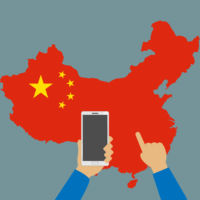Weekly Focus APAC: Alibaba Sets 5-Year Goal to Hit £1.14tn GMV


In this edition of Weekly Focus APAC: Alibaba Sets 5-Year Goal to Hit £1.14tn GMV; Tmall Partners Mitsubishi Chemical to Develop High-Tech Fabric; Starbucks Singapore Lets Customers Skip Store Queues with Mobile Orders; Scoot Drops Payment Processing Fees; and Singapore Moots Travel Ad Changes to Improve Online Transparency.
Alibaba Sets 5-Year Goal to Hit £1.14tn GMV
The Chinese e-commerce giant has ambitions of serving 1 billion annual active consumers and clock at least ¥10tn (£1.14tn) in annual gross merchandise volume by the end of 2024.
The five-year goals for its domestic consumer business were announced by Alibaba Group's executive chairman and CEO, Daniel Zhang, during the company's annual investor day and encompassed primarily its China retail marketplaces, digital media and entertainment, and other local consumer services.
These objectives also paved the way for its longer-term global ambitions of serving two billion customers, supporting 10 million profitable small and midsize businesses, and create 100 million jobs by 2036.
Zhang said: "Today, we are creating and fulfilling new consumption needs with a view to focus on growing our digital consumer population as a whole. We can unlock tremendous synergies between our various consumer-facing businesses to convert and harvest incremental customers across the Alibaba digital economy."
He said the company had 730 million annual active consumers from its China consumer business for the year ended June 30, and 130 million annual active consumers in its cross-border and global retail commerce business.
Its Alipay mobile payment platform had 900 million annual active users in China.
With the penetration rate of Alibaba's China retail marketplaces at just 40% in less-developed areas within the country, compared to 85% in developed areas, Zhang said there were significant opportunities to reach underserved consumers in those less developed areas.
Tmall Partners Mitsubishi Chemical to Develop High-Tech Fabric
In a separate announcement, Alibaba says its online marketplace Tmall has inked a partnership with Japan's acrylic fibre maker, Mitsubishi Chemical, to jointly develop a high-tech, heat-generating fabric that can be used in undergarments.
Tmall will serve as Mitsubishi Chemical's exclusive e-commerce partner in China for three years, selling the latter's acrylic fabric undergarments online and connecting the Japanese company with brands looking to tap China's thermal garment market.
Alibaba said the collaboration showcased Tmall's ability to directly connect a raw material maker to brands that produced finished products. To date, these included brands such as Only, Veromoda, and Maniform.
The partnership also would see Tmall offer brands market insights and analysis on Chinese customers' demand for thermal apparel.
Tmall Fashion and Luxury's general manager Jessica Liu said: "As the biggest and most-comprehensive e-commerce marketplace in the world, Tmall is able to provide data-driven analysis to our merchants, such as consumers' preferences and purchasing behaviour.
"Thermal apparel is one of the fast-growing market segments in China. We are confident this partnership will generate strong synergies between our raw material providers and apparel manufacturing partners," Liu said.
Starbucks Singapore Lets Customers Skip Store Queues with Mobile Orders
The coffee retail chain has launched a new feature, Mobile Order & Pay, that allows customers to order ahead via its mobile app and pick up their beverage at a selected store.
Available at 32 participating stores including outlets in Singapore's Central Business District and Marina Bay Sands, the new service was part of efforts to engage consumers through different touch points and offerings, said Starbucks.
Using the mobile app, customers would be able to customise their order just as they could in-store, with options to choose the number of espresso shots and dairy selections. According to the F&B chain, orders were freshly made and ready for pickup within minutes.
It planned to expand the services to all local outlets by March next year.
Starbucks Singapore's general manager Patrick Kwok said: "We are consistently on the lookout for new ways to enhance our retail offerings and experience for our local customers, meeting their needs and wants. We know that our customers here lead extremely busy lifestyles and prioritise convenience and efficiency, so this feature was developed with them in mind.
"Innovation has always been a key ingredient of Starbucks' culture and we are ready to take on the challenge of introducing new technologies and tools, like Mobile Order & Pay, to help make our customers' experience at Starbucks even more enjoyable," Kwok said.
Its mobile app is available on Google Play and Apple App Store.
Scoot Drops Payment Processing Fees
The Singapore-based budget carrier has removed payment processing fees globally for all bookings made on its direct channels.
Scoot currently provides various payment options across 67 cities in 17 countries and territories, including Apple Pay, PayPal, and credit card as well as local payment platforms such as Singapore's AXS and PayNow, China's WeChat Pay and Alipay, and Konbini in Japan.
Noting that technological advancements had helped bring down associated costs to support payment infrastructures, Scoot said it had been progressively removing payment processing fees in selected markets since March last year, beginning with Europe.
Its CEO Lee Lik Hsin said: "When Scoot first started, we offered a limited range of payment methods at a higher implementation and maintenance cost. As we expanded globally and heard our customers' feedback, we took advantage of advances in payment technology to implement many more payment methods to improve our customers' experience.
"In order to pass on the savings to our customers as our costs came down…now, we are ready to do away with it globally. We hope this gives our customers better value and more reasons to escape the ordinary with us," Lee said.
Singapore Moots Travel Ad Changes to Improve Online Transparency
The Competition and Consumer Commission of Singapore (CCCS) has recommended new guidelines to improve price transparency in travel booking services, both online and offline, and ensure operators avoid misleading consumers with their advertising content.
The move came after a study it conducted uncovered four common practices amongst online travel booking providers that resulted in concerns over consumer protection. These included pre-ticked boxes and "drip pricing", where mandatory and optional charges were not revealed upfront.
According to CCCS, the online travel booking market in Southeast Asia was worth USD$19.4bn (£15.78bn) in 2015 and accounted for 61% of the region's internet economy. Fuelled by increase in online airline and hotel bookings, online travel bookings climbed 15% between 2015 and 2018 to hit US$29.7bn (£24.15bn).
Singapore's online booking market was estimated to be the third-largest in Southeast Asia last year and the highest per-capita online travel booking spending in the region.
With Singapore consumers increasingly turning to online channels for their travel bookings, including comparing and purchasing travel-related products such as air tickets and hotel accommodation online, CCCS said its recommended guidelines aimed to encourage online travel booking providers to adopt transparent pricing practices.
In comparing their price with others, for instance, these suppliers should ensure any price comparisons and use of terms were not false or misleading. They also should include any mandatory charges in their advertised price, the commission said.







Follow Fast Growth Brands